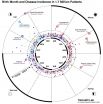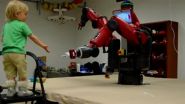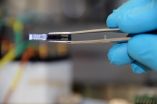How your brain is telling you to vote
Researchers pinpoint a brain area that influences electoral decisions
2015-06-08
(Press-News.org) This news release is available in French.
A new joint study by researchers at the Montreal Neurological Institute and the Centre for the Study of Democratic Citizenship, both at McGill University, has cast some light on the brain mechanisms that support people's voting decisions. Evidence in the study shows that a part of the brain called the lateral orbitofrontal cortex (LOFC) must function properly if voters are to make choices that combine different sources of information about the candidates. The study found that damage to the LOFC leads people to base their vote on simpler information, namely the candidate's good looks. Healthy individuals and those with brain damage affecting other parts of the frontal lobes spontaneously weighed both attractiveness and an assessment of the candidate's competence when making their choices.
The new study provides the first evidence that the LOFC is critical for integrating different kinds of information to allow people to arrive at a preference.
Recent studies of political behaviour suggest that voting decisions can be influenced by "first-impression" social attributions based on physical appearance. Separate lines of research have implicated the orbitofrontal cortex in the judgement of social traits on one hand and economic decision-making on the other, implicating the orbitofrontal cortex region as a candidate for linking social attributes to voting decisions.
"How multiple attributes are combined in decision-making and how values are constructed is an important field that is just starting to be considered," says Dr. Lesley Fellows, a neurologist and researcher at the Montreal Neurological Institute and senior author of the paper in the June 3 issue of the Journal of Neuroscience. "Recent research suggests that several areas in the brain carry information about the value of decision options, but it is not yet clear how these areas work together when we make a choice. The LOFC appears to be important when decisions are hard, helping to select the best from among options of similar value."
The study tested subjects with and without damage affecting the LOFC. Participants took part in a simulated election task, where they were asked to vote for real-life but, unknown politicians based only on their photographs. Imagining themselves in an electoral period, participants were also asked to rate the perceived attractiveness and perceived competence of the candidates.
Participants without lesions in the LOFC appeared to make voting decisions based on both perceived attractiveness and perceived competence. Although subjects with LOFC damage could rate the competence of the candidates, they did not use this information when voting, instead relying only on the attractiveness factor.
"This study provides a strong test of the function of this part of the brain," says Dr. Fellows. "It shows that damage disrupts a specific aspect of how a decision is made. It provides evidence that LOFC is necessary for this function. This is the first time the brain basis of political behaviour has been studied with these methods."
Understanding the brain mechanisms underlying these first impression effects on voting is one route to a deeper understanding of human political behaviour and offers a novel perspective on the broader topic of value-based decision-making, to date studied mainly through an economic lens. The project was an interdisciplinary effort, bringing together McGill neuroscientists and political scientists.
INFORMATION:
Authors on the paper are: Lesley Fellows, Montreal Neurological Institute and RI-MUHC, Chenjie Xia, Montreal Neurological Institute, Dietlind Stolle and Elisabeth Gidengil, of the Centre for the Study of Democratic Citizenship, Political Science Department at McGill University.
This work was supported by the Quebec Fund for Research, Society, and Culture and the Canadian Institutes of Health Research.
Montreal Neurological Institute and Hospital
The Montreal Neurological Institute and Hospital - The Neuro is a world-leading destination for brain research and advanced patient care. Since its founding in 1934 by renowned neurosurgeon Dr. Wilder Penfield, The Neuro has grown to be the largest specialized neuroscience research and clinical centre in Canada, and one of the largest in the world. The seamless integration of research, patient care, and training of the world's top minds make The Neuro uniquely positioned to have a significant impact on the understanding and treatment of nervous system disorders. The Montreal Neurological Institute is a McGill University research and teaching institute. The Montreal Neurological Hospital is part of the Neuroscience Mission of the McGill University Health Centre. For more information, please visit http://www.theneuro.com
ELSE PRESS RELEASES FROM THIS DATE:
2015-06-08
A new study gives insight into the mental health of children and teens with Down syndrome and the behavioral medications that medical caregivers sometimes prescribe for them.
The Cincinnati Children's Hospital Medical Center study shows that teens and young adults between the ages of 12 and 21 were significantly more likely to be on psychotropic medications than children 5 to 11 years old. Among children less than 12, the odds of being on a psychotropic medication increased with age for all classes of medications studied. For 12 to 18 year olds, the odds of being on ...
2015-06-08
NEW YORK, NY (June 8, 2015) - Columbia University scientists have developed a computational method to investigate the relationship between birth month and disease risk. The researchers used this algorithm to examine New York City medical databases and found 55 diseases that correlated with the season of birth. Overall, the study indicated people born in May had the lowest disease risk, and those born in October the highest. The study was published in the Journal of American Medical Informatics Association.
"This data could help scientists uncover new disease risk factors," ...
2015-06-08
PROVIDENCE, R.I. [Brown University] -- Researchers from Brown University are developing a new algorithm to help robots better plan their actions in complex environments. It's designed to help robots be more useful in the real world, but it's being developed with the help of a virtual world -- that of the video game Minecraft.
Basic action planning, while easy for humans, is a frontier of robotics. Part of the problem is that robots don't intuitively ignore objects and actions that are irrelevant to the task at hand. For example, if someone asked you to empty the trashcan ...
2015-06-08
Researchers at the University of Illinois at Urbana-Champaign have uncovered physical mechanisms allowing the manipulation of magnetic information with heat. These new phenomena rely on the transport of thermal energy, in contrast to the conventional application of magnetic fields, providing a new, and highly desirable way to manipulate magnetization at the nanoscale.
"In our study, we make use of the fact that a heat current passing through a magnetic material creates a separation of electron spins. This process creates a current of magnetic dipoles that we use to manipulate ...
2015-06-08
DARIEN, IL - A new study suggests that increased restless legs syndrome (RLS) severity is associated with subsequent increased risk of stroke.
Results show that increased RLS severity is associated with subsequent increased risk of stroke, after considering other known risk factors such as age, smoking, hypertension, and unhealthy diet. There were 161 incident stroke cases during the six-year follow-up.
"We were surprised at the importance of taking into account RLS severity -- it was only severe RLS, not milder RLS, that was associated with increased risk of stroke," ...
2015-06-08
DARIEN, IL - A new study suggests that lower life satisfaction is linked to sleep problems during midlife.
Respondents with higher life satisfaction reported shorter sleep onset latency (SOL). Sleep onset delay among those with low life satisfaction could be the result of worry and anxiety, as reported elsewhere. These findings support the idea that life satisfaction is interlinked with many measures of sleep and sleep quality, suggesting that improving one of these variables might result in improving the other.
"These findings support the idea that life satisfaction ...
2015-06-08
URBANA, Ill. - Emerging adults aged 18 to 25 are often criticized for their poor interpersonal skills, sense of entitlement, and casual work ethic. But a new University of Illinois study suggests that fault-finding adult co-workers could make a big difference in young workers' leadership development by developing relationships with them, modeling the behaviors they wish to see, and providing leadership growth opportunities.
"Young adults in our study had learned a lot from mentors who modeled initiative, drive, and persistence; demonstrated how to communicate with confidence ...
2015-06-08
DARIEN, IL - A new study suggests that children with traumatic brain injuries (TBI) have poorer sleep and more daytime sleepiness in comparison to healthy children.
Results show that children with TBI were more likely to experience greater daytime sleepiness, sleep disturbances and a poorer overall sleep quality. The children with TBI also had impaired emotional, physical and social functioning when compared to healthy children.
"We were surprised that children with a TBI experienced persistent increases in daytime sleepiness and decreases in sleep quality compared ...
2015-06-08
A nuclear physicist and an archaeologist at the University of York have joined forces to produce a unique appraisal of the cultural significance of one of the world's most important locations for scientific inquiry.
In a paper published in the journal, Landscapes, Professor David Jenkins, of the Department of Physics at York, and Dr John Schofield, Head of the University's Department of Archaeology, have investigated CERN, the home of the Large Hadron Collider on the Franco-Swiss border.
Situated between the Jura Mountains and the Alps, CERN was established in 1954 to ...
2015-06-08
This news release is available in German.
Material scientists at ETH Zurich and the Max Planck Institute of Colloids and Interfaces in Potsdam have developed a new type of sensor that can measure carbon dioxide (CO2). Compared with existing sensors, it is much smaller, has a simpler construction, requires considerably less energy and has an entirely different functional principle. The new sensor consists of a recently developed composite material that interacts with CO2 molecules and changes its conductivity depending on the concentration of CO2 in the environment. ...
LAST 30 PRESS RELEASES:
[Press-News.org] How your brain is telling you to vote
Researchers pinpoint a brain area that influences electoral decisions



